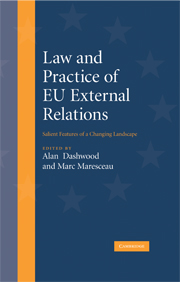Book contents
- Frontmatter
- Contents
- Abbreviations
- Notes on contributors
- Acknowledgements
- Introduction
- PART I Constitutional and institutional questions
- 1 Direct effect and interpretation of international agreements in the recent case law of the European Court of Justice
- 2 Defining competence in EU external relations: lessons from the Treaty reform process
- 3 Article 47 TEU and the relationship between first and second pillar competences
- 4 EC law and UN Security Council Resolutions – in search of the right fit
- 5 Fundamental rights and the interface between second and third pillar
- 6 The EU as a party to international agreements: shared competences, mixed responsibilities
- 7 The Common Commercial Policy enhanced by the Reform Treaty of Lisbon?
- 8 The extent to which the EC legislature takes account of WTO obligations: jousting lessons from the European Parliament
- PART II Bilateral and regional approaches
- PART III Selected substantive areas
- Table of Treaty Provisions
- Index
2 - Defining competence in EU external relations: lessons from the Treaty reform process
from PART I - Constitutional and institutional questions
Published online by Cambridge University Press: 07 September 2009
- Frontmatter
- Contents
- Abbreviations
- Notes on contributors
- Acknowledgements
- Introduction
- PART I Constitutional and institutional questions
- 1 Direct effect and interpretation of international agreements in the recent case law of the European Court of Justice
- 2 Defining competence in EU external relations: lessons from the Treaty reform process
- 3 Article 47 TEU and the relationship between first and second pillar competences
- 4 EC law and UN Security Council Resolutions – in search of the right fit
- 5 Fundamental rights and the interface between second and third pillar
- 6 The EU as a party to international agreements: shared competences, mixed responsibilities
- 7 The Common Commercial Policy enhanced by the Reform Treaty of Lisbon?
- 8 The extent to which the EC legislature takes account of WTO obligations: jousting lessons from the European Parliament
- PART II Bilateral and regional approaches
- PART III Selected substantive areas
- Table of Treaty Provisions
- Index
Summary
Introduction: the Laeken Declaration
The Treaty establishing a Constitution for Europe signed in October 2004 proposed important substantive and institutional changes to the European Union's system of external relations, and the Treaty of Lisbon (TL) signed in December 2007 largely implements these changes in its amendments of the Treaty on European Union (TEU) and the EC Treaty (re-named the Treaty of the Functioning of the European Union). The process of commenting on the drafting of both the Constitutional Treaty and the TL, discussing their implications and evaluating them has all encouraged scholars to look again at the constitutional basis for external relations law, to address some of the remaining ambiguities in the existing state of the law, and to think about the appropriate legal framework for a policy which is ever more important for the future development of the EU. Furthermore, the revised Treaty text itself reflects recent trends in external relations, in the sense of policy developments (e.g. moving forward on security and defence policy), institutional roles (e.g. the role of the European Council), as well as attempting to reflect current thinking and current case law.
In assessing the results of this reform process, the Laeken Declaration of December 2001, which mandated the Convention on the Future of Europe, still makes a good starting point.
Information
- Type
- Chapter
- Information
- Law and Practice of EU External RelationsSalient Features of a Changing Landscape, pp. 34 - 69Publisher: Cambridge University PressPrint publication year: 2008
Accessibility standard: Unknown
Why this information is here
This section outlines the accessibility features of this content - including support for screen readers, full keyboard navigation and high-contrast display options. This may not be relevant for you.Accessibility Information
- 21
- Cited by
